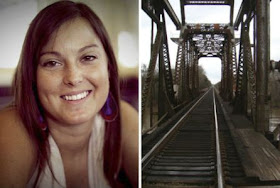SAVANNAH, Ga. – A jury has found a railroad company responsible in the 2014 death of a movie worker on a Georgia railroad bridge, awarding the young woman's family $3.9 million in damages.
The verdict against CSX Transportation came Monday in a civil lawsuit the parents of Sarah Jones filed in the Feb. 20, 2014, crash. Jones was killed when a freight train slammed into film workers shooting a movie about singer Gregg Allman.
Attorneys for Jones' family argued CSX should have taken precautions to avoid the crash. They said two CSX trains that passed the movie crew before the collision should have reported the group.
CSX attorneys blamed filmmakers who were denied permission by CSX to shoot on its tracks. Film director Randall Miller served a year in jail for Jones' death.
=================
The parents of Sarah Jones, the camera assistant who was killed during filming of a movie in Georgia in 2014, won a significant legal victory Monday when a court awarded the family $11.2 million in damages.
Jones, 27, was fatally struck by a train that crashed into a crew filming a scene on a railway for the Gregg Allman biopic “Midnight Rider.” Several other crew members also were injured during filming of the scene on a historic trestle outside of Savannah. Authorities said producers did not have permission to film on the railway.
The accident prompted multiple state and federal investigations and galvanized the film industry, prompting calls for greater attention to safety on sets worldwide. The judgment comes at a time when set safety issues are again rattling the industry after a stuntman died during filming of the AMC television series “The Walking Dead” last week. That accident also occurred in Georgia.
Sarah Jones in an undated family photo. (Colin Duran / AP)
Attorneys for CSX, the train’s operator, had argued that they had not authorized the “Midnight Rider” filmmakers to shoot on the railway.
However, on Monday the jury found that CSX was primarily liable for the accident and should pay 35% of the total judgment.
“CSX is deeply sympathetic to the terrible loss suffered by the family of Ms. Sarah Jones, but respectfully disagrees with the conclusions reached by the jury today and will appeal,” CSX said in statement.
Jurors ruled that Jones’ parents should be given just under $2 million for pain and suffering and $9.2 million for economic losses.
“Elizabeth and I have spent the last 3 plus years wanting to understand how our daughter, Sarah Elizabeth Jones, tragically lost her life,” Richard and Elizabeth Jones said in a statement. “That search has now come to a close…. We felt that this trial was necessary in order to learn what happened that tragic day of February 20, 2014. It is only with the discovery of what could have been done differently that we might avoid another similar tragic loss of life.”
Jones’ parents agreed to a confidential settlement with the film’s producers in 2014. The film’s director, Randall Miller, pleaded guilty to involuntary manslaughter in 2015. Miller was sentenced to up to two years in prison and fined $20,000.
Miller was found responsible for 28% of the amount of the latest ruling. Rayonier Performance Fibers, owners of the land where the accident occurred, are responsible for 18% and the rest of the liability is divided between individual members of the film’s production company.
Sarah Jones was not found liable for the accident.
“Midnight Rider" was based on the life of Allman, a founding member of Southern rock group the Allman Brothers Band.
Allman was originally included in the civil suit against the film’s producers but was later dropped from the case.
The singer later sued the film’s producers, alleging they had lost the rights to tell his story after Jones died. Allman subsequently dropped his suit as part of an out-of-court agreement.





